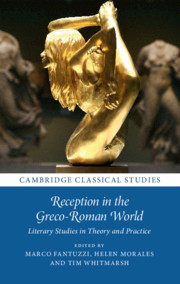Book contents
- Reception in the Greco-Roman World
- Cambridge Classical Studies
- Reception in the Greco-Roman World
- Copyright page
- Dedication
- Contents
- Figures
- Notes on Contributors
- Acknowledgements
- Abbreviations
- Altered States: Cultural Pluralism and Psychosis in Ancient Literary Receptions
- Part I Archaic and Classical Poetics
- Chapter 1 Neighbors and the Poetry of Hesiod and Pindar
- Chapter 2 Stesichorus and the Name Game
- Chapter 3 From Epinician Praise to the Poetry of Encomium on Stone:CEG 177, 819, 888–9 and the Hyssaldomus Inscription
- Chapter 4 Geometry of Allusions: The Reception of Earlier Poetry in Aristophanes’ Peace
- Part II Classical Philosophy and Rhetoric, and Their Reception
- Part III Hellenistic and Roman Poetics
- Part IV Multimedia and Intercultural Receptions in the Second Sophistic and Beyond
- References
- Index
Chapter 1 - Neighbors and the Poetry of Hesiod and Pindar
from Part I - Archaic and Classical Poetics
Published online by Cambridge University Press: 05 June 2021
- Reception in the Greco-Roman World
- Cambridge Classical Studies
- Reception in the Greco-Roman World
- Copyright page
- Dedication
- Contents
- Figures
- Notes on Contributors
- Acknowledgements
- Abbreviations
- Altered States: Cultural Pluralism and Psychosis in Ancient Literary Receptions
- Part I Archaic and Classical Poetics
- Chapter 1 Neighbors and the Poetry of Hesiod and Pindar
- Chapter 2 Stesichorus and the Name Game
- Chapter 3 From Epinician Praise to the Poetry of Encomium on Stone:CEG 177, 819, 888–9 and the Hyssaldomus Inscription
- Chapter 4 Geometry of Allusions: The Reception of Earlier Poetry in Aristophanes’ Peace
- Part II Classical Philosophy and Rhetoric, and Their Reception
- Part III Hellenistic and Roman Poetics
- Part IV Multimedia and Intercultural Receptions in the Second Sophistic and Beyond
- References
- Index
Summary
This paper explores the category of neighbor from a literary-critical perspective. Hesiod’s depiction in Works and Days of the relationships between neighbors as characterized by random proximity and uncertain ethical status is adopted as a frame for understanding the stylistic approach of the epic poet and the affinities that Pindar’s epinicians show to his work. A case is made for the interpretive utility of the lateral and arbitrary structure of neighboring, and the desirability of such a model alongside the more common idea of genealogical inheritance within the modern scholarly treatment of ancient receptions.
- Type
- Chapter
- Information
- Reception in the Greco-Roman WorldLiterary Studies in Theory and Practice, pp. 23 - 47Publisher: Cambridge University PressPrint publication year: 2021

